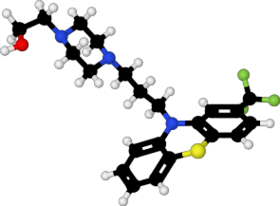Fluphenazine
 | |
 | |
| Clinical data | |
|---|---|
| Trade names | Prolixin, Modecate, Moditen others |
| AHFS/Drugs.com | Monograph |
| MedlinePlus | a682172 |
| Pregnancy category | |
| Routes of administration | by mouth, IM, depot injection (fluphenazine decanoate) |
| ATC code | |
| Legal status | |
| Legal status | |
| Pharmacokinetic data | |
| Bioavailability | 2.7% (by mouth) |
| Metabolism | unclear[1] |
| Elimination half-life | IM 15 hours (HCL), 7-10 days (decanoate)[1] |
| Excretion | Urine, faeces |
| Identifiers | |
| |
| CAS Number | |
| PubChem CID | |
| IUPHAR/BPS | |
| DrugBank | |
| ChemSpider | |
| UNII | |
| KEGG | |
| ChEBI | |
| ChEMBL | |
| ECHA InfoCard |
100.000.639 |
| Chemical and physical data | |
| Formula | C22H26F3N3OS |
| Molar mass | 437.523 g/mol |
| 3D model (JSmol) | |
| |
| |
| (verify) | |
Fluphenazine, sold under the brand names Prolixin among others, is an antipsychotic medication.[1] It is used in the treatment of chronic psychoses such as schizophrenia,[1][2] and appears to be about equal in effectiveness to low-potency antipsychotics like chlorpromazine.[3] It is given by mouth, injection into a muscle, or just under the skin.[1] There is also a long acting injectable version that may last for up to four weeks.[1] Fluphenazine decanoate, the depot injection form of fluphenazine, should not be used by people with severe depression.[4]
Common side effects include movement problems, sleepiness, depression and increased weight.[1] Serious side effects may include neuroleptic malignant syndrome, low white blood cell levels, and the potentially permanent movement disorder tardive dyskinesia.[1] In older people with psychosis as a result of dementia it may increase the risk of dying.[1] It may also increase prolactin levels which may result in milk production, enlarged breasts in males, impotence, and the absence of menstrual periods.[1] It is unclear if it is safe for use in pregnancy.[1] Fluphenazine is a typical antipsychotic of the phenothiazine class.[1] Its mechanism of action is not entirely clear but believed to be related to its ability to block dopamine receptors.[1] In up to 40% of those on long term phenothiazines, liver function tests become mildly abnormal.[5]
Fluphenazine came into use in 1959.[6] The injectable form is on the World Health Organization's List of Essential Medicines, the most effective and safe medicines needed in a health system.[7] It is available as a generic medication.[1] In the United States the tablets costs between 0.22 and 0.42 USD per day for a typical dose.[1] The wholesale cost in the developing world of the long acting form is between 0.20 and 6.20 USD per injection as of 2014.[8] It was discontinued in Australia around mid 2017.[9]
Other animals
In horses, it is sometimes given by injection as an anxiety-relieving medication, though there are many negative common side effects and it is forbidden by many equestrian competition organizations.[10]
References
- 1 2 3 4 5 6 7 8 9 10 11 12 13 14 15 "fluphenazine decanoate". The American Society of Health-System Pharmacists. Archived from the original on 2015-12-08. Retrieved Dec 1, 2015.
- ↑ "Product Information: Modecate (Fluphenazine Decanoate Oily Injection)" (PDF). TGA eBusiness Services. Bristol-Myers Squibb Australia Pty Ltd. 1 November 2012. Archived from the original on 2 August 2017. Retrieved 9 December 2013.
- ↑ Tardy, M; Huhn, M; Engel, RR; Leucht, S (Aug 3, 2014). "Fluphenazine versus low-potency first-generation antipsychotic drugs for schizophrenia". The Cochrane Database of Systematic Reviews. 8: CD009230. doi:10.1002/14651858.CD009230.pub2. PMID 25087165.
- ↑ "Modecate Injection 25mg/ml - Patient Information Leaflet (PIL) - (eMC)". www.medicines.org.uk. Retrieved 2017-11-06.
- ↑ "Fluphenazine". livertox.nih.gov. Retrieved 2017-11-06.
- ↑ McPherson, Edwin M. (2007). Pharmaceutical Manufacturing Encyclopedia (3rd ed.). Burlington: Elsevier. p. 1680. ISBN 9780815518563. Archived from the original on 2015-12-08.
- ↑ "WHO Model List of Essential Medicines (19th List)" (PDF). World Health Organization. April 2015. Archived (PDF) from the original on 13 December 2016. Retrieved 8 December 2016.
- ↑ "Fluphenazine Decanoate". International Drug Price Indicator Guide. Archived from the original on 2 August 2017. Retrieved 2 December 2015.
- ↑ Rossi, S, ed. (July 2017). "Fluphenazine - Australian Medicines Handbook". Australian Medicines Handbook. Adelaide, Australia: Australian Medicines Handbook Pty Ltd. Retrieved 8 August 2017.
- ↑ Loving, DVM, Nancy S. (31 March 2012). "Effects of Behavior-Modifying Drug Investigated (AAEP 2011)". TheHorse.com. The Horse Media Group. Archived from the original on 6 January 2017. Retrieved 13 December 2016.